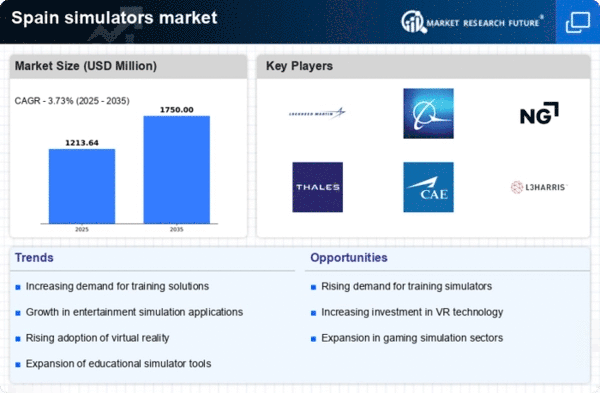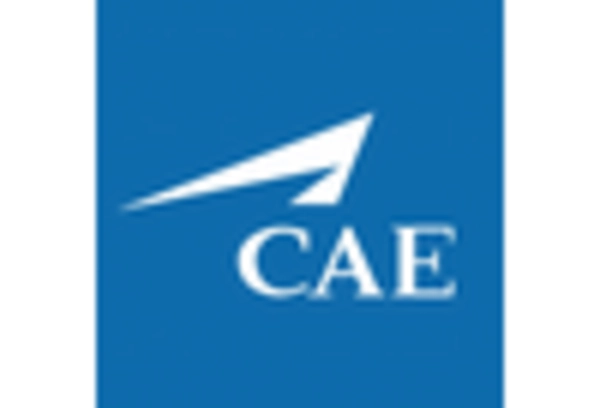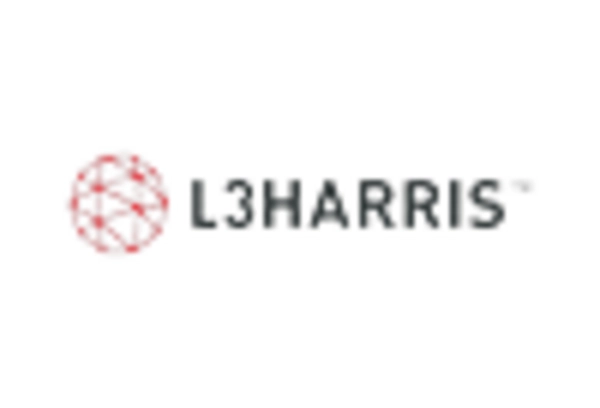Regulatory Compliance and Standards
Regulatory compliance and adherence to industry standards are increasingly influencing the simulators market in Spain. Various sectors, particularly aviation and healthcare, are subject to stringent regulations that mandate the use of simulators for training and assessment. This regulatory landscape compels organizations to invest in high-quality simulation solutions to meet compliance requirements. For example, the European Union has established guidelines that necessitate the use of flight simulators for pilot training, thereby boosting demand in the aviation sector. Consequently, the simulators market is likely to expand as organizations strive to align with these regulations.
Rising Popularity of Virtual Reality
The rising popularity of virtual reality (VR) is significantly impacting the simulators market in Spain. VR technology offers immersive experiences that enhance training and educational outcomes across various sectors. Industries such as gaming, education, and healthcare are increasingly adopting VR-based simulators to provide engaging and effective training solutions. The market for VR in training applications is projected to grow at a CAGR of 7.8% from 2025 to 2030, indicating a strong trend towards immersive learning environments. This shift towards VR is likely to drive the simulators market, as organizations seek innovative ways to enhance their training programs.
Growing Demand for Training Solutions
The increasing need for effective training solutions across various sectors is driving the simulators market in Spain. Organizations are recognizing the value of simulation-based training as it enhances learning outcomes and reduces training costs. In sectors such as aviation, healthcare, and military, the demand for realistic training environments is surging. For instance, the aviation sector has seen a rise in the use of flight simulators, with the market projected to grow at a CAGR of 5.2% from 2025 to 2030. This trend indicates a robust appetite for advanced training methodologies, thereby propelling the simulators market forward.
Integration of Artificial Intelligence
The integration of artificial intelligence (AI) into simulation technologies is emerging as a transformative driver for the simulators market in Spain. AI enhances the realism and adaptability of simulations, allowing for more personalized training experiences. This technological advancement is particularly relevant in sectors such as healthcare, where AI-driven simulators can replicate complex medical scenarios. The potential for AI to improve training efficiency and effectiveness is prompting organizations to invest in these advanced solutions. As a result, the simulators market is anticipated to grow significantly, with AI integration playing a pivotal role in shaping its future.
Investment in Research and Development
Investment in research and development (R&D) is a crucial driver for the simulators market in Spain. Companies are allocating substantial resources to innovate and enhance their simulation technologies. This focus on R&D is evident in the growing number of partnerships between educational institutions and industry players, aimed at developing cutting-edge simulation tools. The Spanish government has also been supportive, providing funding for projects that aim to advance simulation technologies. As a result, the market is expected to witness a compound annual growth rate (CAGR) of 6.5% over the next five years, reflecting the potential for innovation in the simulators market.
















